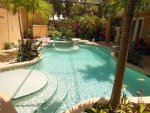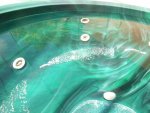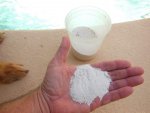Hello,
Several years ago I noticed deposits of fine white powder in the spa, pool floor and filter.
I have collected and saved the powder out of the spa with a Aqua-tech vac and have measured one pound over one year.
This represents about one third of the total deposit (spa + pool + filter). So I estimate about 3lbs powder in one year.
I had a pool leak Technician perform a leak check of the pool and he found no leaks, with a air pressure leak decay test.
The pool looses about 1/8" water per day in hot Florida sun; this is typical for pools this area.
The powder is pure white, hard, granular and very fine and is not water soluble.
The Tech suggested the powder was coming from within the spa PVC pipe system, which he suspects is flex PVC (but not confirmed).
He thinks the flex PVC (or rigid PVC) is deteriorating and releasing the powder.
My next test is to clean pool/spa/filter and and attach flex tubes with dark color fabric strainers to each jet and spa spill over to isolate the source.
In-ground 13,000 gal pool 12 yrs old
Pool is Gunite with no signs of deterioration
Spa is Fiberglass with no signs of deterioration
Salt water chlorination at setting 30%
Filter cartridge fiber type (not DE type)
Water analysis indicates no problems
The pool is plumbed to discharge pump full volume into spa and spill into pool
This mystery must be solved, I think I am on borrowed time.
Please offer suggestions and experience.
Thanks for reading....Jeff in Florida
Several years ago I noticed deposits of fine white powder in the spa, pool floor and filter.
I have collected and saved the powder out of the spa with a Aqua-tech vac and have measured one pound over one year.
This represents about one third of the total deposit (spa + pool + filter). So I estimate about 3lbs powder in one year.
I had a pool leak Technician perform a leak check of the pool and he found no leaks, with a air pressure leak decay test.
The pool looses about 1/8" water per day in hot Florida sun; this is typical for pools this area.
The powder is pure white, hard, granular and very fine and is not water soluble.
The Tech suggested the powder was coming from within the spa PVC pipe system, which he suspects is flex PVC (but not confirmed).
He thinks the flex PVC (or rigid PVC) is deteriorating and releasing the powder.
My next test is to clean pool/spa/filter and and attach flex tubes with dark color fabric strainers to each jet and spa spill over to isolate the source.
In-ground 13,000 gal pool 12 yrs old
Pool is Gunite with no signs of deterioration
Spa is Fiberglass with no signs of deterioration
Salt water chlorination at setting 30%
Filter cartridge fiber type (not DE type)
Water analysis indicates no problems
The pool is plumbed to discharge pump full volume into spa and spill into pool
This mystery must be solved, I think I am on borrowed time.
Please offer suggestions and experience.
Thanks for reading....Jeff in Florida




